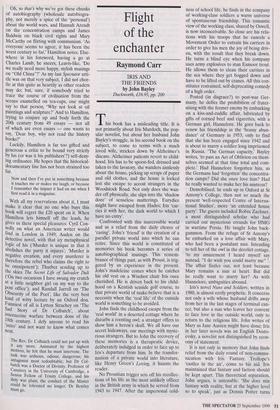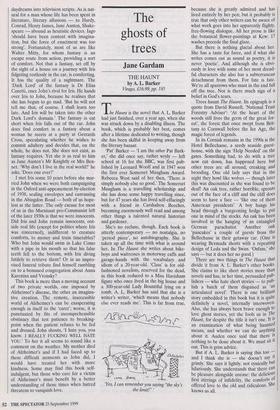Flight of the enchanter
Raymond Carr
IRIS AND THE FRIENDS by John Bayley Duckworth, £16.95, pp. 200 This book has a misleading title. It is not primarily about Iris Murdoch, the pop- ular novelist, but about her husband John Bayley's struggle, in his second book on the subject, to come to terms with a much loved wife, stricken down by Alzheimer's disease. Alzheimer patients revert to child- hood. Iris has to be spoon-fed, dressed and taken to the lavatory, she wanders aimlessly about the house; picking up scraps of paper and old clothes, and the house is locked lest she escape to accost strangers in the Woodstock Road. Not only does she wan- der off physically, she slips into the 'shadow doze' of senseless mutterings. Eurydice might have escaped from Hades; Iris 'car- ries it with her, the dark world to which I have no entry'.
Confronted with this inaccessible world and as a relief from the daily chores of `caring', John's 'friend' is the creation of a parallel private world into which he can retire. Since this world is constituted of memories his book becomes a series of autobiographical musings. This remem- brance of things past, as with Proust, is trig- gered by an experience in the present. John's madeleine comes when he catches his old vest on a Windsor chair Iris once cherished. He is driven back to his child- hood on a Kentish seaside golf course, to that private world of make-believe that is a necessity when the 'real life' of the outside world is something to be avoided.
John finds the childhood escape from the `real world' in a deserted cottage where he disturbs a roosting owl; a stranger offers to show him a heron's skull. We all have our secret hideaways, our meetings with myste- rious strangers. But to John the recovery of these memories is a therapeutic device, deliberately indulged in order to face up to Iris's departure from him. In the transfor- mation of a private world into literature, like Henry Green's Loving, it haunts the reader.
No Proustian trigger sets off his recollec- tions of his life as the most unlikely officer in the British army in which he served from 1943 to 1947. After the impersonal cold- ness of school life, he finds in the company of working-class soldiers a warm universe of spontaneous friendship. This romantic view of the working class, shared by Orwell, is now inconceivable. So close are his rela- tions with his troops that he cancels a Movement Order to entrain his carriers in order to give his men the joy of being driv- en, with the result that they break down. He turns a blind eye when his company uses army explosives to stun Exmoor trout. He allows them to clean their carriers in the sea where they get bogged down and have to be lifted out by cranes. All this con- stitutes restrained, self-deprecating comedy of a high order.
Posted (in disgrace?) to post-war Ger- many, he defies the prohibition of frater- nising with the former enemy by embarking on a kiss-and-cuddle affair, lubricated by gifts of corned beef and cigarettes, with a German girl, Hannelore. He goes back to renew his friendship in the 'brassy abun- dance' of Germany in 1953, only to find that she has been engaged since 1942 and is about to marry a soldier long imprisoned in Russia. 'The German capacity,' Bayley writes, `to pass an Act of Oblivion on them- selves seemed at that time total and com- plete.' Had Hannelore forgotten him, as the Germans had 'forgotten' the concentra- tion camps? Did she once love him? Had he really wanted to make her his mistress?
Demobilised, he ends up in Oxford at St Antony's College, then not so much the present 'well-respected Centre of Interna- tional Studies', more 'an extended house party'. The guests included Robin Zaehner, a most distinguished scholar who had carried out mysterious errands for HMG in wartime Persia. He taught John back- gammon. From the refuge of St Antony's he embarked on a love affair with Mary, who had been a postulant nun. Intending to tell her of the owl in the derelict cottage, `to my amazement I heard myself say instead, "I do wish you could marry me" '. The affair fizzles out, not least because Mary remains a nun at heart. But did he really want to marry her? As with Hannelore, ambiguities abound.
Iris's novel Nuns and Soldiers, written in 1980, is almost eerily prophetic. It concerns not only a wife whose husband drifts away from her in the last stages of terminal can- cer, but also a nun who leaves her convent to face love in the outside world, only to return to the religious life. John writes of Mary as Jane Austen might have done; Iris in her later novels was an English Dosto- evsky, a novelist not distinguished by econ- omy of statement.
It is not only in memory that John finds relief from the daily round of non-commu- nication with Iris. Fantasy, Trollope's `castles in the air', come to his aid. Iris maintained that fantasy and faction should be kept apart. This theoretical separation, John argues, is untenable. 'She does mix fantasy with reality, but at the higher level so to speak', just as Dennis Potter turns daydreams into television scripts. As is nat- ural for a man whose life has been spent in literature, literary allusions — to Hardy, Conrad, Henry James, Jane Austen, Shake- speare — abound as heuristic devices. Iago `should have been content with imagina- tion, but the force of enactment was too strong'. Fortunately, most of us are like Walter Mitty, for whom fantasy is an escape route from action, providing a sort of comfort. Not that a fantasy, set off by the sight of a house on a journey with Iris fidgeting restlessly in the car, is comforting. It has the quality of a nightmare. The `Dark Lord' of the fantasy is Dr Elias Canetti, once John's rival for Iris. He hands over Iris to John, because he realises that she has begun to go mad. 'But he will not tell me that, of course. I shall learn too late. And Iris will be taken into the other Dark Lord's domain.' The fantasy is cut short when Iris falls out of the car. John does find comfort in a fantasy about a woman he meets at a party at Gerrards Cross, speculating whether he wishes to commit adultery and decides that, on the whole, he does not. She does not exist, as fantasy requires. Yet she is as real to him as Jane Austen's Mr Knightly or Mrs Ben- net. 'Why don't I live in the real world?' he asks. 'Does one ever?'
I met Iris some 10 years before she mar- ried John when we were both campaigning in the Oxford anti-appeasement by-election of 1938, sealing envelopes and canvassing in the Abingdon Road — both of us hope- less at the latter. The only excuse for most of us in the Marxisant pro-Communist left of the later 1930s is that we were innocents. Did Iris and John remain innocents, out- side real life (except for politics where Iris was concerned), indifferent to creature comforts, to money and train timetables? Who but John would swim in Lake Como with a pipe in his mouth so that his false teeth fell to the bottom, with Iris diving futilely to retrieve them? Or in an impro- vised funeral tribute find himself rambling on to a bemused congregation about Anna Karenina and Vronsky?
This book is more than a moving account of two private worlds, one imposed by Alzheimer's disease, the other an imagina- tive creation. The remote, inaccessible world of Alzheimer's can be exasperating enough in itself to the `carer'; worse, it is punctuated by fits of incomprehensible obstinacy that test patience to breaking- point when the patient refuses to be fed and dressed. John shouts, 'I hate you, you know. I REALLY FUCKING WELL HATE YOU.' To her it all seems to sound like a comment on the weather. My mother died of Alzheimer's and if I had faced up to these difficult moments as John did, I would have treated her with more kindness. Some may find this book self- indulgent, but those who care for a victim of Alzheimer's must benefit by a better understanding of those times when hatred threatens to vanquish love.



























































































 Previous page
Previous page